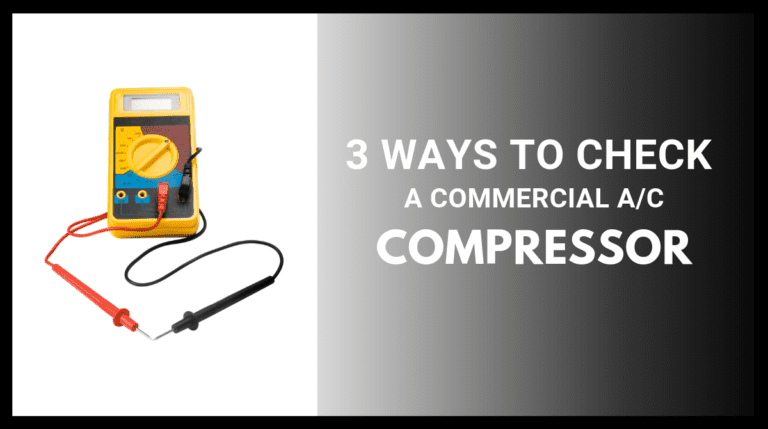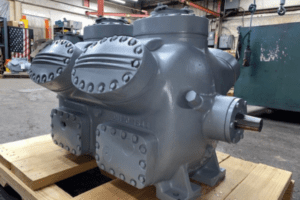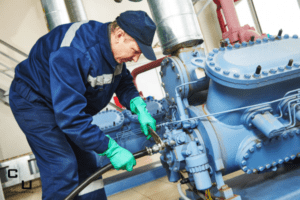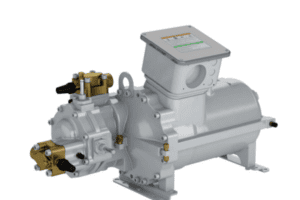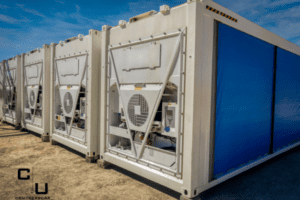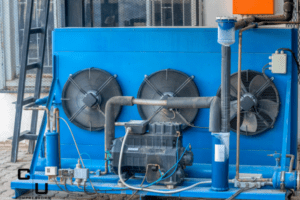In case of a malfunction in your AC unit, there is a high chance that your compressor is faulty. To diagnose problems within your compressor, you will need several different tools including a multimeter. A multimeter measures voltage, electric resistance, and electric current.
Once you diagnose the cause of the problem, you may get the right professional to solve it. In this article, we will discuss the three ways that you can check your commercial AC’s compressor.
1. Oil Pressure and Discharge Oil Pressure Checks
The ideal oil pressure of a particular commercial compressor depends on its size, type, and its intended use. As the compressor grows older it consumes more oil due to wear and tear. It is for this reason why you have to perform oil checks.
Discharge oil pressure is the variable that you measure at the discharge end of the compressor. The discharge pressure is a combination of input oil pressure and crankcase oil pressure. You measure the discharge oil pressure on a gauge at the discharge point.
Net oil pressure is the amount of pressure exerted by the oil pump. To determine the net oil pressure, subtract the crankcase oil pressure from the discharge oil pressure.
Most commercial compressors operate at a minimum of 20 PSI. If your net oil pressure is lower than 20 PSI it means the HVAC system is running on low lubrication. It could also mean that wear and tear are severe among the internal parts.
Pressure checks are an essential part of compressor maintenance. It lets you know if you need an oil top-up or new parts.
2. Checking for Bearing Vibration
Bearing vibration may cause a loss of efficiency in your HVAC system. Bearing vibration may cause other parts in your commercial compressor to vibrate, throwing them out of balance.
You can detect bearing vibration by closely listening to the compressor. If the compressor is securely mounted and makes quite a bit of noise, bearing vibration could be the issue.
Contact a technician to run diagnostics on your machine. The technician uses a series of probes in your compressor to test and measure bearing vibration. The test reveals the source and extent of the problem. Replacing the bearings could solve the problem.
3. Electric Check
For your safety, we recommend shutting down the HVAC unit and allowing some time for the unit to cool down so it is safe to touch. Find the switch and turn off the supply of power to the air conditioning unit. If you are unable to find the switch, look for the circuit breaker. Disable the supply of power to the area of the building where you are working.
Examine the wires leading to the compressor. Check for any damage or cuts. In case you notice any damage to the wiring, that could be the cause of the issue. Electric wires connect to the compressor via terminals.
Examine the terminals for burns or damage. For further tests, use a multimeter. The multimeter checks for effective electric flow.
On the dial at the front of your multimeter, set it to continuity. The setting allows you to test for electric flow within the individual terminals. If you cannot get any readings, there is a high chance that you have broken or damaged terminals.
On your compressor, there are three terminals; C, R, and S. These letters stand for Common, Run, and Start. A standard multimeter comes with two pins; red and black.
Place the red pin on the C and the black pin on the S terminal. A reading of 30 ohms or less is a good sign. Anything above 30 ohms could mean that your compressor is faulty.
Place the red pin on the terminal C and the black on terminal R, while on the continuity setting. The ideal reading should be less than 30 ohms. Repeat the process while the red pin is on R while the black pin is on the S terminal.
If the resistance of your compressor is significantly higher than 30 ohms, there could be an overload problem.
For your business to run effectively, you need effective machines. All machines require some maintenance and checks from time to time, compressors are no exception. The check discussed above helps you improve the efficiency of your HVAC system.
As always, it is best to consult a professional to check out your HVAC unit and the compressor’s health. In the event it isn’t working properly, Compressors Unlimited offers a range of remanufactured compressors to do the job right!

